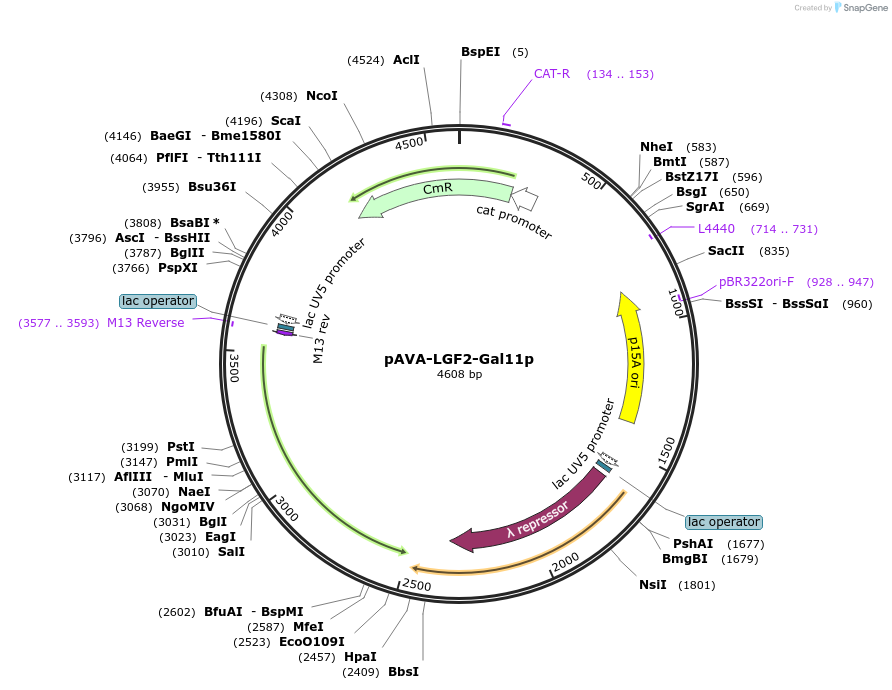pAVA-LGF2-Gal11p
(Plasmid
#127481)
-
PurposePositive control for the AVA-seq system. LGF2 (lambda CI associated) and Gal11p (RNAp associated) interaction
-
Depositing Lab
-
Sequence Information
Ordering
| Item | Catalog # | Description | Quantity | Price (USD) | |
|---|---|---|---|---|---|
| Plasmid | 127481 | Standard format: Plasmid sent in bacteria as agar stab | 1 | $89 | |
Backbone
-
Vector backbonepBT
-
Backbone manufacturerAgilent #240067
-
Modifications to backboneinserted AD domain of pTRG (Agilent #240066) adjacent but convergent to the DBD
-
Vector typeBacterial Expression
Growth in Bacteria
-
Bacterial Resistance(s)Chloramphenicol, 25 μg/mL
-
Growth Temperature37°C
-
Growth Strain(s)DH5alpha
-
Growth instructionsThe Malek lab recommends using BacterioMatch II Validation Reporter Competent Cells (Catalog #200192) for downstream applications.
-
Copy numberLow Copy
Gene/Insert
-
Gene/Insert nameLGF2-Gal11p
-
SpeciesS. cerevisiae (budding yeast)
-
Insert Size (bp)419
-
Entrez GeneGAL11 (a.k.a. YOL051W, ABE1, MED15, RAR3, SDS4, SPT13)
Cloning Information
- Cloning method Restriction Enzyme
- 5′ cloning site BstXI (not destroyed)
- 3′ cloning site BstXI (not destroyed)
- 5′ sequencing primer TCCGTTGTGGGGAAAGTTATC
- 3′ sequencing primer AGCTTCCAGTTGTTCAGCCA
- (Common Sequencing Primers)
Terms and Licenses
-
Academic/Nonprofit Terms
-
Industry Terms
- Not Available to Industry
Trademarks:
- Zeocin® is an InvivoGen trademark.
These plasmids were created by your colleagues. Please acknowledge the Principal Investigator, cite the article in which the plasmids were described, and include Addgene in the Materials and Methods of your future publications.
-
For your Materials & Methods section:
pAVA-LGF2-Gal11p was a gift from Joel Malek (Addgene plasmid # 127481 ; http://n2t.net/addgene:127481 ; RRID:Addgene_127481) -
For your References section:
High-resolution protein-protein interaction mapping using all-versus-all sequencing (AVA-Seq). Andrews SS, Schaefer-Ramadan S, Al-Thani NM, Ahmed I, Mohamoud YA, Malek JA. J Biol Chem. 2019 Jul 26;294(30):11549-11558. doi: 10.1074/jbc.RA119.008792. Epub 2019 Jun 10. 10.1074/jbc.RA119.008792 PubMed 31182485



